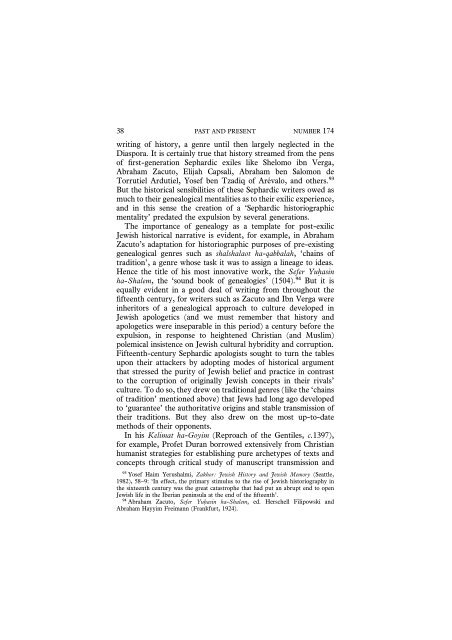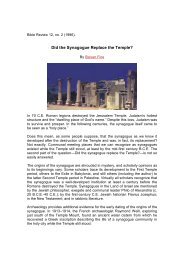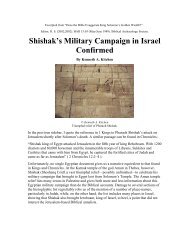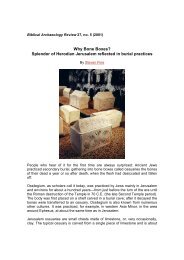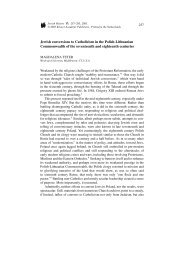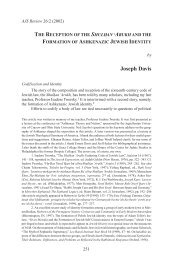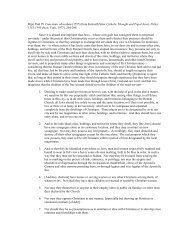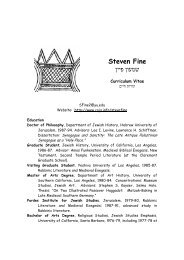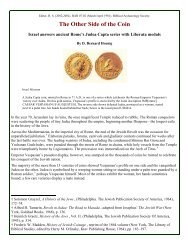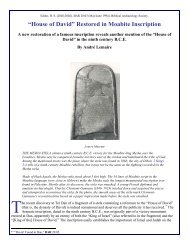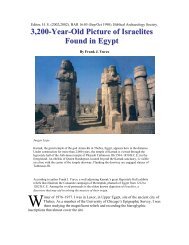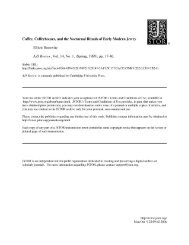jews and christians in fifteenth-century spain
jews and christians in fifteenth-century spain
jews and christians in fifteenth-century spain
You also want an ePaper? Increase the reach of your titles
YUMPU automatically turns print PDFs into web optimized ePapers that Google loves.
38 PAST AND PRESENT NUMBER 174<br />
writ<strong>in</strong>g of history, a genre until then largely neglected <strong>in</strong> the<br />
Diaspora. It is certa<strong>in</strong>ly true that history streamed from the pens<br />
of first-generation Sephardic exiles like Shelomo ibn Verga,<br />
Abraham Zacuto, Elijah Capsali, Abraham ben Salomon de<br />
Torrutiel Ardutiel, Yosef ben Tzadiq of Arévalo, <strong>and</strong> others.93<br />
But the historical sensibilities of these Sephardic writers owed as<br />
much to their genealogical mentalities as to their exilic experience,<br />
<strong>and</strong> <strong>in</strong> this sense the creation of a ‘Sephardic historiographic<br />
mentality’ predated the expulsion by several generations.<br />
The importance of genealogy as a template for post-exilic<br />
Jewish historical narrative is evident, for example, <strong>in</strong> Abraham<br />
Zacuto’s adaptation for historiographic purposes of pre-exist<strong>in</strong>g<br />
genealogical genres such as shalshalaot ha-qabbalah, ‘cha<strong>in</strong>s of<br />
tradition’, a genre whose task it was to assign a l<strong>in</strong>eage to ideas.<br />
Hence the title of his most <strong>in</strong>novative work, the Sefer Yuh1as<strong>in</strong><br />
ha-Shalem, the ‘sound book of genealogies’ (1504).94 But it is<br />
equally evident <strong>in</strong> a good deal of writ<strong>in</strong>g from throughout the<br />
<strong>fifteenth</strong> <strong>century</strong>, for writers such as Zacuto <strong>and</strong> Ibn Verga were<br />
<strong>in</strong>heritors of a genealogical approach to culture developed <strong>in</strong><br />
Jewish apologetics (<strong>and</strong> we must remember that history <strong>and</strong><br />
apologetics were <strong>in</strong>separable <strong>in</strong> this period) a <strong>century</strong> before the<br />
expulsion, <strong>in</strong> response to heightened Christian (<strong>and</strong> Muslim)<br />
polemical <strong>in</strong>sistence on Jewish cultural hybridity <strong>and</strong> corruption.<br />
Fifteenth-<strong>century</strong> Sephardic apologists sought to turn the tables<br />
upon their attackers by adopt<strong>in</strong>g modes of historical argument<br />
that stressed the purity of Jewish belief <strong>and</strong> practice <strong>in</strong> contrast<br />
to the corruption of orig<strong>in</strong>ally Jewish concepts <strong>in</strong> their rivals’<br />
culture. To do so, they drew on traditional genres (like the ‘cha<strong>in</strong>s<br />
of tradition’ mentioned above) that Jews had long ago developed<br />
to ‘guarantee’ the authoritative orig<strong>in</strong>s <strong>and</strong> stable transmission of<br />
their traditions. But they also drew on the most up-to-date<br />
methods of their opponents.<br />
In his Kelimat ha-Goyim (Reproach of the Gentiles, c.1397),<br />
for example, Profet Duran borrowed extensively from Christian<br />
humanist strategies for establish<strong>in</strong>g pure archetypes of texts <strong>and</strong><br />
concepts through critical study of manuscript transmission <strong>and</strong><br />
93 Yosef Haim Yerushalmi, Zakhor: Jewish History <strong>and</strong> Jewish Memory (Seattle,<br />
1982), 58–9: ‘In effect, the primary stimulus to the rise of Jewish historiography <strong>in</strong><br />
the sixteenth <strong>century</strong> was the great catastrophe that had put an abrupt end to open<br />
Jewish life <strong>in</strong> the Iberian pen<strong>in</strong>sula at the end of the <strong>fifteenth</strong>’.<br />
94 Abraham Zacuto, Sefer Yuh1as<strong>in</strong> ha-Shalem, ed. Herschell Filipowski <strong>and</strong><br />
Abraham Hayyim Freimann (Frankfurt, 1924).


